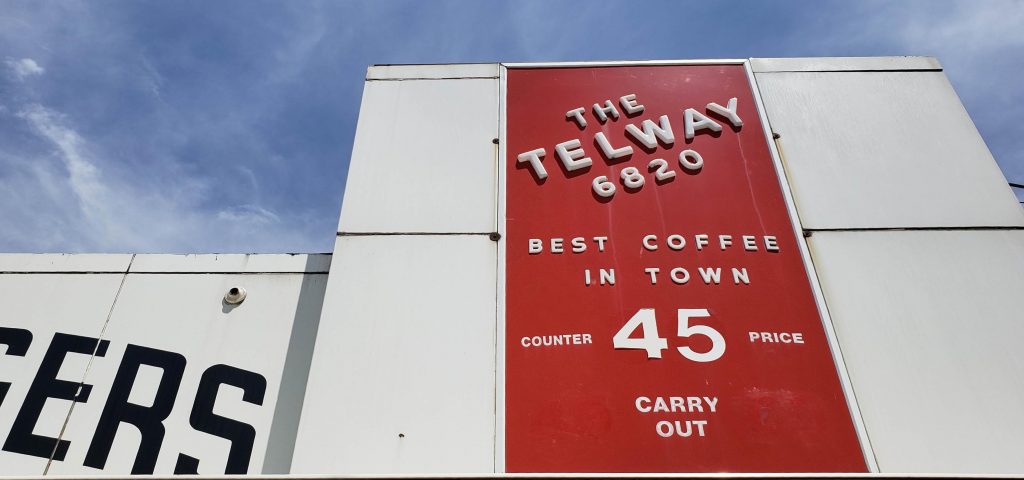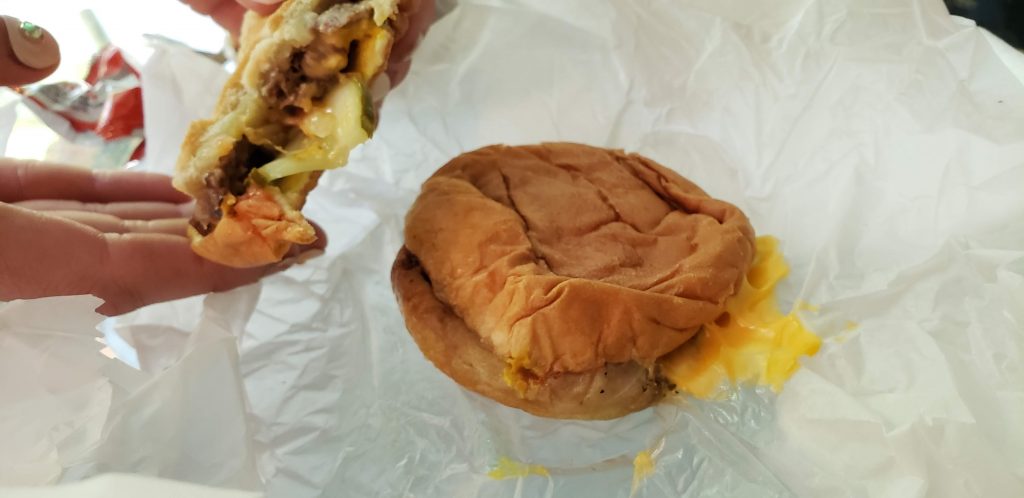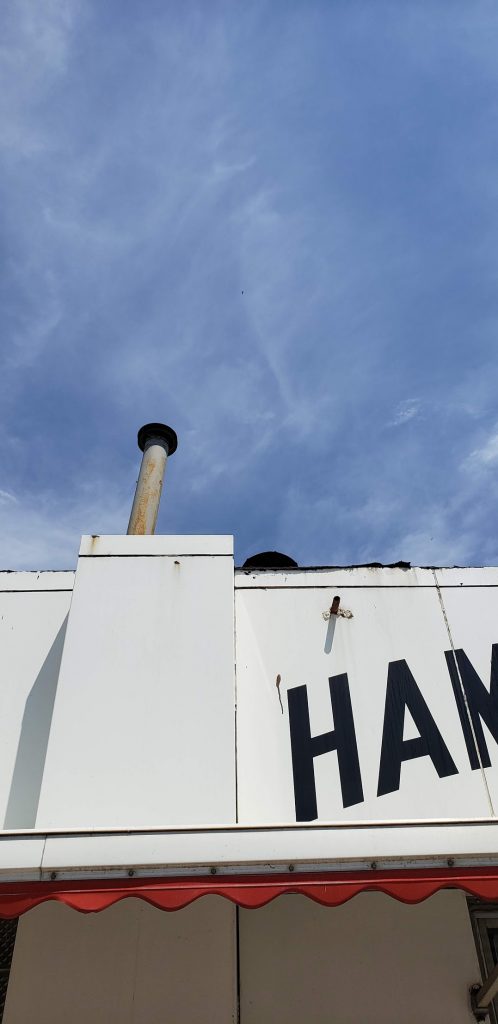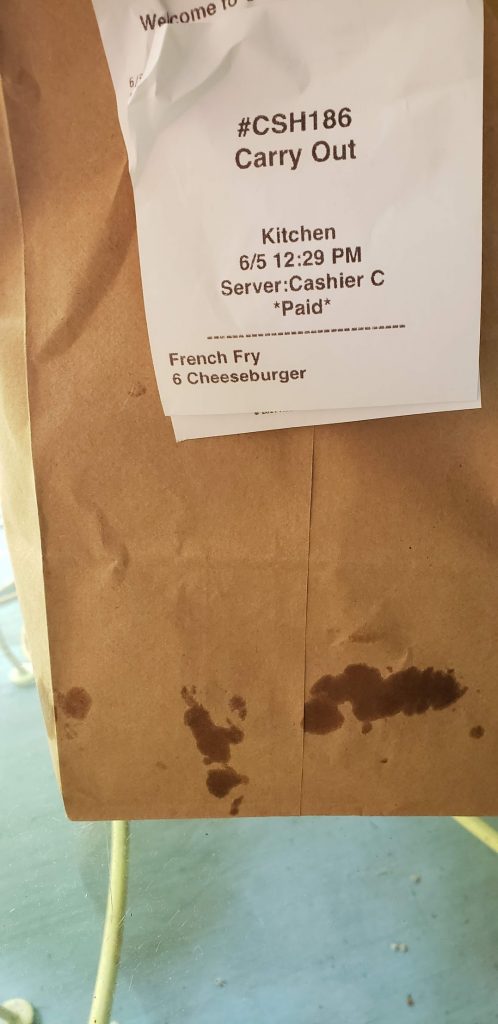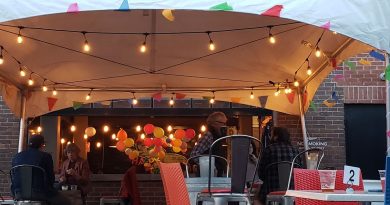Burgerbanism: Telway Hamburgers, the Final Frontier of Southwest Detroit
Burgerbanism is an ongoing, however infrequent, series on restaurants and their architectural, economic, and social context in cities.
A sticky hot summer Saturday seemed as good a time as any for me to finally try out the Detroit classic, Telway Hamburgers. It’s embarrassing for me to write stuff like that after having lived in Detroit for so many years, I admit. But we had just dropped off two friends at DTW, sending them on their way to Newark Liberty as they negotiate a move to New York City– as is the wont of most young professionals sucked into the whirlpool of the brain drain in Michigan- and we needed to dive into something that would imbue us with a sense of Detroit pride– plus some caloric envigoration.
The Spot
Telway Hamburgers, located at the northwest corner of Michigan and Martin, was founded in 1944. Longtime owner Earl Owens, who passed away in 2017, probably purchased it in the 1960’s, so it’s been an iconic spot for some time. Owens lived to the ripe old age of 88, suggesting that maybe bags of greasy sliders aren’t as bad for your health as we thought.
Save for a sticker on the inch-thick bulletproof acrylic indicating that you can indeed use credit cards to pay, the interior and exterior both look largely timeless, probably unchanged from their original iteration. Inside, there’s but an order window and a pickup window– no seating, no parking lane converted to sidewalk dining, whatever. No frills, but no problem. There’s a menu with about a dozen things– a dozen being a generous description. Operative is whether you want a hamburger or a cheeseburger. And, of course, how many.
The Goods
Telway is, of, course, known for sliders. They come to you in an innocuous brown paper bag, and their authenticity is marked by prevalent grease stains. We ate to our hearts’ contents– two hungry folk- with six sliders and a quite ample, small basket of fries. The fries, I’m pleased to report, were salted to perfection and fried to perfection. Six tiny cheeseburgers, loaded with grilled onions and pickles, and fries– for under $10. In this economy! Open 24 hours a day! Detroit’s dearth of late late night food has oft been a thorn in my side. What’s a boy to do in the wee small hours? Other than, you know, dig into my freezer and air fry some buffalo chicken strips, or whatever? Wonder no more, for the answer is Telway.
We did not try the coffee, but they claim that it is the best in town. An eyebrow is raised at this claim. But one does not visit a burger joint for the coffee.
Dennis Kefallinos Owes Half A Million Dollars In Water Bills.
Urban Context
Since there’s not really a whole lot to write about Telway Hamburgers except that you need to get yourself some Telway Hamburgers, let’s think about what else is going on nearby. The intersection actually has a lot going on from a city planning perspective. It’s to some degree the point around which the MIchigan Avenue deteriorates from something vaguely resembling an urban neighborhood to a postapocalyptic highway wasteland of strip malls and used car lots. It’s also a half-decent microcosm of Detroit, with a lively interplay of slumlord speculation, dense built environment, strip malls, timeless retail establishments, the Chaldean Liquor Store Industrial Complex, and, of course, microcosms of racial and socioeconomic strife, without which it wouldn’t be a proper party!
Who are the biggest real estate players here? Well, I’m not gonna name names, but there is one whose last name ends in -efallinos. First name ends in -ennis. There are, of course, a few shell companies involved, because there always are. The one building seems to have been purchased from Wayne County after some sort of state of delinquency. Kefallinos did well with the 6747 building, which increased from a last-sold valuation of $65,000 in a 2009 sale to $140,000 in 2017. 6729 Michigan, on the other hand, went the other way– a $61,000 sale in 1993 to a $5,200 sale in 2014.
Property Inventory
| Parcel | Address | Area | Last Sale Price (Date) | Taxable Value / s.f. |
| 18002318. | 6747 MICHIGAN AVE | 6775.00 s.f. | $140,000 (2017) | $9.56 |
| 18002317. | 6729 MICHIGAN AVE | 7228.0 sf | $5,200 (2014) | $1.18 |
| 18002319. | 6835 MICHIGAN AVE | 53,970.84 | $950,000.00 (2014) | $4.23 |
| 18002320-1 | 6865 MICHIGAN AVE | 43124.4 sf | $160,000 (2014) | $4.94 |
| 18002437-8 | 6800 MICHIGAN AVE (Telway Lot) | 6432 s.f. | $155,000 (1986) | $1.77 |
| 18002436. | 6820 MICHIGAN AVE (Telway Hamburgers) | 5989 s.f. | $155,000 (1986– likely included in adjacent parcel sale) | $5.44 |
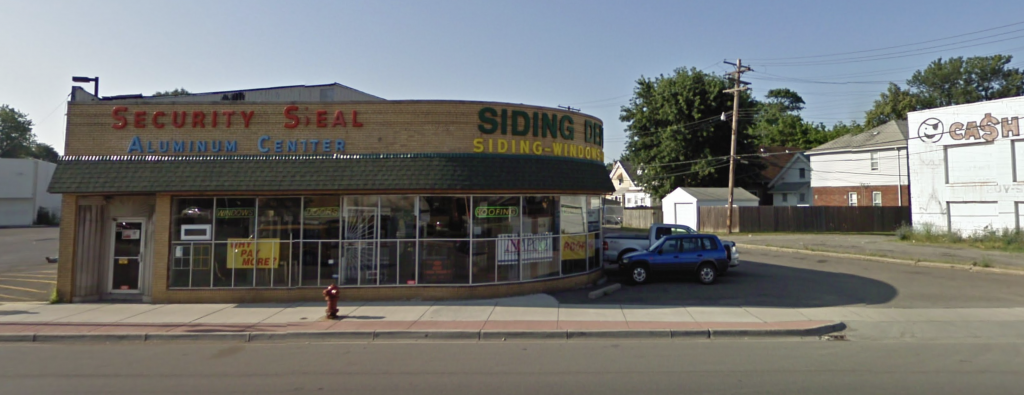
Why We Can’t Have Nice Things: Strip Malls And Blight Speculators
Kefallinos– who, as I pointed out earlier this year, is notorious for racking up hundreds of thousands of dollars in back taxes and water bills and getting away with it- acquired the building in 2014 for a paltry $5,200. 2014 was, of course, a different time. Namely, before Kefallinos was supposedly banned from buying more properties, even though that seems kind of to not have held. Shell company Metro Building Group, LLC, has racked up dozens of blight tickets, according to the latest city data. But none too recently. The buildings are notably not compliant with the city’s exhaustive vacant property ordinance, and Dennis appears to have some sort of handshake deal with Terry Martin in BSEED over the fact that correction orders issued to the property in 2018 seem to have never been addressed and never ticketed. A great mystery indeed.
You can visit Mondry Hardware, owned by some folks in Deep Macomb who have, for the entirety of COVID, not only refused to wear masks in their own store, but also have consistently chain smoked in the store. God bless this great nation. It’s sleazy behavior, surely, but it’s also a great little hardware store. Troy-ite Terry Barash, whoever that is, owns a couple of gravely, muddy lots at the next intersection to the east. Look, Terry– if this is the city of tomorrow, I want no part of it! The Archdiocese (or possibly a shady shell corporation it may have set up to avoid liability in litigation defense?) owns a large lot with a church on Martin.
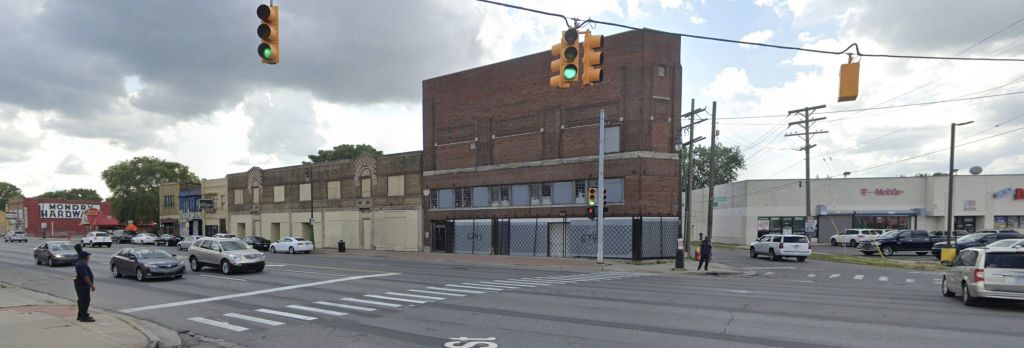
Old Detroit, New Detroit, Newer Detroit
At the southwest corner of Martin and Michigan, Super Dollar Store Plus occupies a parcel owned by a holding company registered to a multimillion dollar mansion in Bloomfield Hills. You’re gonna just have your home address– 1515 Lone Pine Rd., Bloomfield Hills, MI, 48302- hanging out in public records?! What is this, amateur hour?! Come on. This and the lot next to it appear to both be owned by one Isam Samona, who is also registered at a West Bloomfield address.
Further sleuthing suggests that this is likely a constituent of the powerful Suburban Chaldean Liquor Store Dollar Store Industrial Complex, an utterly prominent fulcrum of real estate capital and racial conflict in the inner city for the past half century. Chaldeans– mostly Iraqi Christians- bought up a lot of property at deep discounts as white owners fled the city in the 1960’s and 1970’s after the Uprising. A common thread of animosity between Chaldeans (most of whom live in the ‘burbs) and Black Detroiters (many of whom lack access to capital and economic opportunity) continues to this day, highlighted in the day-to-day retail transactions of a majority Black or Latino inner city with limited commercial resources (and extraordinarily limited capital access) beyond the usually Chaldean-owned liquor store, the Chaldean-owned grocery store, and/or the Chaldean-owned dollar store.
It does not appear that building permits were ever obtained to demolish the adjacent structure (ID 18002320-1) some time 2013-2016, which has since been built into– wait for it- another strip mall! Just what we needed!
The Future of Telway
Though its departed owner is no longer around, Telway Hamburgers seems to be soldiering on, frying the fries, burging the burgers, and brewing their signature coffee. It shall likely remain a classic. Though it’s a crying shame that the intersection itself is so dominated by just a bunch of surface parking lots. Maybe if the Kef gets his act together he could actually renovate those crumbling buildings of his and make something fun happen, and we could make this change. Or if the dollar store imperators could figure out how to move the needle from “let’s just put strip malls everywhere selling cheap shit to the inner city,” it’s possible we could have something vaguely more interesting here. Like, you know, housing, or streetscaping that makes this stretch of Michigan look less apocalyptic.
Or whatever, I don’t know, I’m not a city planner or anything.
In the meantime, get yourself some food from a Detroit classic.
Check out Telway Hamburgers, located at 6820 Michigan Ave, Detroit, MI 48210. Or check out their Yelp page. Burgerbanism is an ongoing, however infrequent, series on restaurants and their architectural, economic, and social context in cities. There is currently one other entry in the series, The Twelve Dishes of Detroit Christmas.

